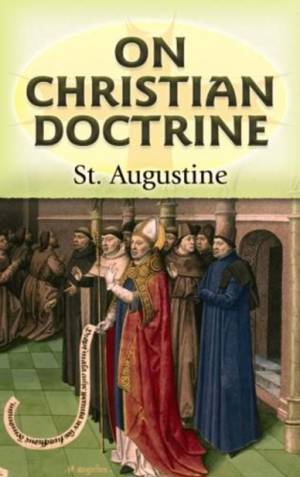
Bedankt voor het vertrouwen het afgelopen jaar! Om jou te bedanken bieden we GRATIS verzending (in België) aan op alles gedurende de hele maand januari.
- Afhalen na 1 uur in een winkel met voorraad
- Gratis thuislevering in België
- Ruim aanbod met 7 miljoen producten
Bedankt voor het vertrouwen het afgelopen jaar! Om jou te bedanken bieden we GRATIS verzending (in België) aan op alles gedurende de hele maand januari.
- Afhalen na 1 uur in een winkel met voorraad
- Gratis thuislevering in België
- Ruim aanbod met 7 miljoen producten
Zoeken
Omschrijving
Since the dawn of the fifth century, theology students, religious scholars, and Christian readers have turned to this volume for instruction. Written by one of the foremost leaders in the development of Christian thought, it offers practical as well as theoretical guidance on how to read the Bible and explain the meaning of scripture. Augustine intended his treatise for the priests in his North African diocese of Hippo, but ultimately, the saint's counsel laid the groundwork for modern hermeneutics and semiotics.
The first of On Christian Doctrine's four parts begins with an overview of the subjects treated in holy scripture. Subsequent parts discuss signs and their recognition, the distinctions between literal and figurative expressions, and the scriptures' stylistic combination of eloquence and wisdom. Above all, Augustine's text concerns itself with the ways in which individuals can live in harmony with Jesus' teachings. Christians and non-Christians alike value this work for its role in historical theology, its influence on the development of Biblical interpretation, and its insights into the mind of a great Christian philosopher and ecclesiastic.
The first of On Christian Doctrine's four parts begins with an overview of the subjects treated in holy scripture. Subsequent parts discuss signs and their recognition, the distinctions between literal and figurative expressions, and the scriptures' stylistic combination of eloquence and wisdom. Above all, Augustine's text concerns itself with the ways in which individuals can live in harmony with Jesus' teachings. Christians and non-Christians alike value this work for its role in historical theology, its influence on the development of Biblical interpretation, and its insights into the mind of a great Christian philosopher and ecclesiastic.
Specificaties
Betrokkenen
- Auteur(s):
- Uitgeverij:
Inhoud
- Aantal bladzijden:
- 192
- Taal:
- Engels
Eigenschappen
- Productcode (EAN):
- 9780486469188
- Verschijningsdatum:
- 26/01/2009
- Uitvoering:
- Paperback
- Formaat:
- Trade paperback (VS)
- Afmetingen:
- 135 mm x 211 mm
- Gewicht:
- 199 g

Alleen bij Standaard Boekhandel
+ 24 punten op je klantenkaart van Standaard Boekhandel
Beoordelingen
We publiceren alleen reviews die voldoen aan de voorwaarden voor reviews. Bekijk onze voorwaarden voor reviews.












